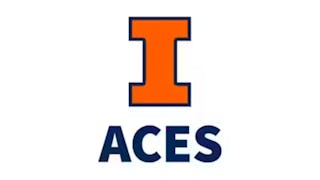This course explores how Generative AI, particularly Large Language Models (LLMs), can transform governmental reports and accounting practices. You will learn how AI can optimize financial data extraction, improve decision-making, and enhance the efficiency of accounting processes. The course addresses key questions such as:



Recommended experience
What you'll learn
Understand the role of AI and LLMs in modern accounting practices.
Utilize LLMs to extract structured financial data from unstructured governmental reports.
Evaluate the accuracy and efficiency of AI-enabled data extraction frameworks.
Skills you'll gain
- Scalability
- Unstructured Data
- Financial Reporting
- Robotic Process Automation
- Accounting
- Generative AI
- Application Programming Interface (API)
- Large Language Modeling
- Machine Learning Methods
- Artificial Intelligence
- Governmental Accounting
- Financial Data
- Decision Making
- Prompt Engineering
- Data Processing
- User Interface (UI)
Details to know

Add to your LinkedIn profile
May 2025
9 assignments
See how employees at top companies are mastering in-demand skills

There are 4 modules in this course
By the end of Module 1, learners will gain a foundational understanding of AI and machine learning and their relevance to accounting. They will be able to describe Large Language Models (LLMs) and their applications in the field while recognizing both the benefits and challenges of integrating LLMs into accounting practices. Additionally, they will understand the importance of prompt engineering in shaping LLM outputs and appreciate how technological advancements have made LLMs more accessible to non-technical users.
What's included
4 videos2 readings2 assignments1 discussion prompt
By the end of Module 2, learners will understand various methods for implementing LLMs in accounting, including UI, API, UI-RPA, and API-RPA, and be able to evaluate their advantages and limitations. They will develop the ability to choose the most suitable implementation approach for different accounting tasks while considering key integration factors. Additionally, they will gain insights into practical considerations and make informed decisions about LLM adoption based on organizational needs and available resources.
What's included
5 videos1 reading2 assignments1 discussion prompt
By the end of Module 3, learners will understand the challenges of extracting financial data from unstructured sources and explore the components and workflow of an LLM-enabled data extraction framework. They will learn how to apply prompt engineering techniques to enhance extraction accuracy and recognize how the framework can be adapted for various financial documents. Additionally, they will appreciate the efficiency and accuracy benefits that LLMs bring to financial data extraction.
What's included
6 videos1 reading2 assignments1 discussion prompt
By the end of Module 4, learners will be able to evaluate the accuracy and efficiency of an LLM-enabled data extraction framework and interpret its results across different financial documents. They will identify common extraction errors and apply strategies to address them while refining prompts to enhance performance. Additionally, they will explore considerations for scaling the framework to handle larger datasets and different LLMs effectively.
What's included
3 videos1 reading3 assignments1 discussion prompt
Earn a career certificate
Add this credential to your LinkedIn profile, resume, or CV. Share it on social media and in your performance review.
Instructor

Explore more from Business Essentials

Coursera Instructor Network

Coursera Instructor Network

Coursera Instructor Network
 Status: Free Trial
Status: Free TrialUniversity of Illinois Urbana-Champaign
Why people choose Coursera for their career





Open new doors with Coursera Plus
Unlimited access to 10,000+ world-class courses, hands-on projects, and job-ready certificate programs - all included in your subscription
Advance your career with an online degree
Earn a degree from world-class universities - 100% online
Join over 3,400 global companies that choose Coursera for Business
Upskill your employees to excel in the digital economy
Frequently asked questions
To access the course materials, assignments and to earn a Certificate, you will need to purchase the Certificate experience when you enroll in a course. You can try a Free Trial instead, or apply for Financial Aid. The course may offer 'Full Course, No Certificate' instead. This option lets you see all course materials, submit required assessments, and get a final grade. This also means that you will not be able to purchase a Certificate experience.
When you purchase a Certificate you get access to all course materials, including graded assignments. Upon completing the course, your electronic Certificate will be added to your Accomplishments page - from there, you can print your Certificate or add it to your LinkedIn profile.
You will be eligible for a full refund until two weeks after your payment date, or (for courses that have just launched) until two weeks after the first session of the course begins, whichever is later. You cannot receive a refund once you’ve earned a Course Certificate, even if you complete the course within the two-week refund period. See our full refund policy.
More questions
Financial aid available,


